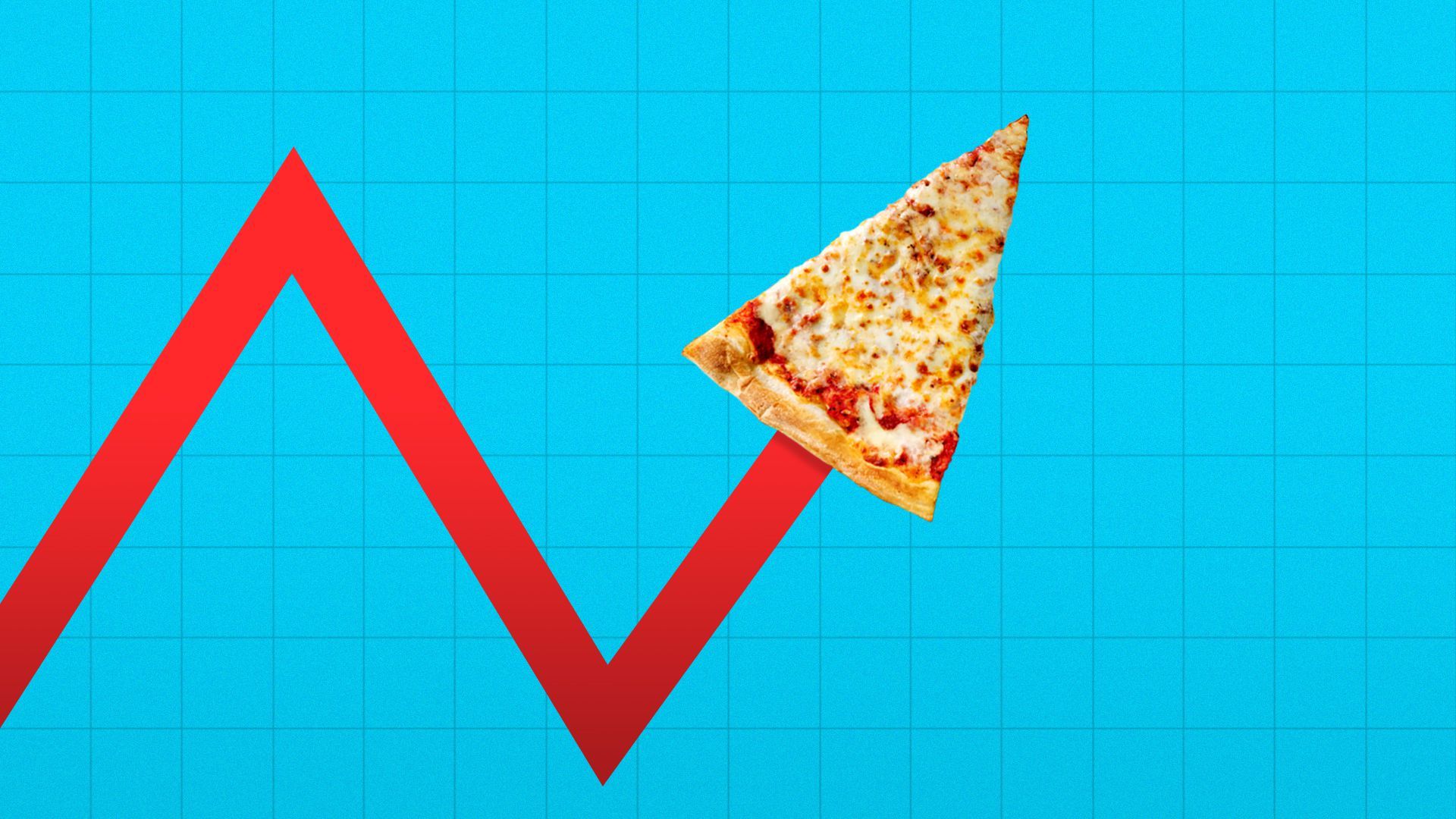| | | | | | | Presented By Kalshi | | | | Axios Markets | | By Matt Phillips and Emily Peck · Jun 07, 2022 | | ☀️ Morning! Matt here. Breaking news! Sometimes the stock market doesn't make much sense (see stock splits). Also, we examine the ugliest collapse in housing affordability on record, and signs of life in Chinese markets. Oh, and be sure to read to the end, where we'll start regularly sharing our favorite non-markets fixations... 📺 🎧 🌎 Today's edition, edited by Kate Marino, is 1,153 words, 4.5 minutes. | | | | | | 1 big thing: The stock market is a silly place |  | | | Illustration: Annelise Capossela/Axios | | | | Amazon is the latest of the tech behemoths to split its stock, giving its share price a knee-jerk bump yesterday, Matt writes. Why it matters: Well, the thing is ... it doesn't. Not really. Amazon's split means one of its shares now becomes 20, and the price of one share is lower. How it works: Think of a public company as a pizza. Its shares are slices. A stock split is merely a way of cutting the same exact pizza into thinner slices. - That's it. Nothing else changes.
- The size of the pie stays the same. The crust is no more crisp and delicious, the pepperoni no more salty and piquant, the cheese, no cheesier.
Backstory: Once upon a time, stock splits were a way for companies with soaring share prices to make it easier for investors to buy their stocks. - This was thought to be particularly important for individual traders, who sometimes didn't have the cash on hand to buy the 100-share lots that were the standard unit of stock trading.
- During the tech stock boom of the late 1990s, stock splits rose in popularity and were often associated with huge surges in share prices.
Yes, but: All that is ancient history. And if you can't afford to buy a whole share of, say, Amazon, which last week was trading at around $2,500, you can buy so-called fractional shares, which allow you to buy, you guessed it, the fraction of the share that you can afford. And, yet: Amazon's stock price rose roughly 2% yesterday after its split, beating out the Nasdaq which was up just 0.4%. What gives? Our thought bubble: Well, it depends on what you think the stock market is. If you think it's supposed to be a massive hive-mind calculator constantly estimating and re-estimating the outlook for a company's corporate profits, revenues and future dividends, it makes no sense for a split to generate a boost in price. - On the other hand, if you think the stock market is also a massive casino, where humans with all their foibles are constantly fumbling around placing bets in an effort to predict what stocks other investors will bet on, splits make a bit more sense.
- For instance, some academics have noticed that people tend to see lower-priced stocks as having more potential to rise than higher-priced stocks.
The bottom line: To be clear, this isn't true. It's an irrational belief. So, it's sort of silly for a stock to rise because a split lowers its price. - Even so, Amazon shot to the top of Fidelity's list of most heavily traded stocks by retail investors yesterday, proving once again that the stock market, like Camelot, is indeed a very silly place.
|     | | | | | | 2. Catch up quick | | 🏦 SEC chair Gary Gensler expected to outline ideas for improving stock market efficiency. (WSJ) ⬆️ Australia lifts rates by most in 22 years to battle inflation. (FT) 📉 BuzzFeed plunges 41% after insider selling ban lifted. (WSJ) |     | | | | | | 3. 🏚 Sharpest drop in house affordability on record |  Data: FactSet; Chart: Erin Davis/Axios Visuals Surging home prices and mortgage rates cut housing affordability by 29% over the last year, as measured by the National Association of Realtors, Matt writes. - It's the sharpest year-over-year decline in affordability on record.
Why it matters: The cost of housing is a major source of irritation for the American public after two years of pandemic restrictions and persistent inflation. A separate report from housing market research firm Black Knight published yesterday shows that the monthly principal and interest payment on an average-priced home, by a buyer who puts 20% down, has gone up by roughly $600 —44% — since the start of the year. How it works: The drop in affordability is being driven by two components. - Surging house prices: One popular gauge of home prices known as the Case-Shiller index showed home prices posting their biggest ever year-on-year gain in March when they rose 20.6%.
- Surging mortgage rates: Over the last year, the rate for a conventional 30-year fixed-rate mortgage has jumped from 3% to more than 5%.
What they're saying: "Given 2022's affordability collapse, these [home price appreciation] levels likely are at or near the peaks for this cycle. Key question is how much and how quickly they will decline," Bank of America analysts wrote in a research note published on Friday. |     | | | | | | A message from Kalshi | | The future of trading? A new asset class is making waves | | |  | | | | Wall Street has been trying to regulate event contracts trading for decades. Now, it's here- Kalshi is the first regulated exchange that offers markets on economics, politics, climate and more. Get exclusive access to this disruptive new platform. | | | | | | 4. Yellen heads to the hot seat |  | | | Photo: Jason Connolly-Pool/Getty Images | | | | Treasury Secretary Janet Yellen is testifying before the Senate today (and the House tomorrow), where she'll likely be grilled about inflation — and what role the 2021 pandemic rescue package played in driving up prices. - The backdrop: In a strange series of events, Bloomberg reported that a forthcoming book claims that during the early days of the Biden administration, Yellen pushed for a smaller rescue package, based on inflation fears, Axios' Neil Irwin writes.
- That would align Yellen's private views then with the current mainstream economic consensus — that the package did contribute to inflation. But over the weekend, Yellen denied it.
Why it matters: To understand this seemingly obscure dispute is to understand a central fault line between the Biden administration, and economists outside the administration who are sympathetic to its goals. The intrigue: In conversations with numerous sources involved with the rescue plan, none have suggested Yellen was fighting for a smaller package internally. - There is a way to thread the needle as to what happened. Yellen truly did embrace the go-big approach, as justified by the need to mitigate the risk of a sluggish recovery.
- But it also would make sense if she privately shared some of the worries that were common among members of her intellectual tribe about the risk of inflation, even if she ultimately judged that going big was the best policy strategy — and the only politically viable one.
The bottom line: Recriminations over the scale of the pandemic rescue, and its contributions to inflation, are unlikely to end anytime soon — and are sure to color the debate the next time the economy is in need of stimulus. Go deeper. |     | | |  | | | | If you like this newsletter, your friends may, too! Refer your friends and get free Axios swag when they sign up. | | | | | | | | 5. China's markets thaw |  Source: FactSet; Chart: Axios Visuals The harshest of China's COVID-related lockdowns might be over. That's good news for markets — and the global economy, Axios' Kate Marino writes. The big picture: The world's second-largest economy has shown signs of slowing in recent months amid the draconian lockdowns, dragging down global companies that rely on Chinese consumers and manufacturing. State of play: Chinese state media said Sunday that Beijing would reopen public transport and restaurant dining, the FT reports. That's on the heels of Shanghai's moves to reopen last week. - Also: In a positive sign for China's ailing tech stocks, authorities are soon expected to end a yearlong probe into the ride-hailing company, Didi — the poster child for the government's crackdown on the industry, the Wall Street Journal wrote.
The impact: The CSI 300 — an index pegged to Chinese stock exchanges that has shed 15% this year — gained 2% over the last two days. And it's up 4.4% since a week ago when Shanghai first said it would begin loosening COVID restrictions. |     | | | | | | A message from Kalshi | | This disruptive app allows you to trade directly on the future | | |  | | | | Nearly all fintech platforms are struggling, yielding negative profits due to inflation and rising inflation rates. We've found a new asset class that has given a 59% ROI for the top 10% of traders. It's the first time these event contracts are offered in a regulated marketplace. Get access today. | | | | ⚡️ 1 thing Matt loves: Norm Macdonald's last comedy special. The Canadian comic and former "Saturday Night Live" cast member was quite sick when he recorded this just-released Netflix special from home in 2020. I always liked Norm — who died of cancer last September — and was wheezing with laughter throughout. It's called "Nothing Special," but it is. |  | It's called Smart Brevity®. Over 200 orgs use it — in a tool called Axios HQ — to drive productivity with clearer workplace communications. | | | | | | Axios thanks our partners for supporting our newsletters. If you're interested in advertising, learn more here.
Sponsorship has no influence on editorial content. Axios, 3100 Clarendon Blvd, Arlington VA 22201 | | | You received this email because you signed up for newsletters from Axios.
Change your preferences or unsubscribe here. | | | Was this email forwarded to you?
Sign up now to get Axios in your inbox. | | | | Follow Axios on social media:    | | | | | |












No comments:
Post a Comment